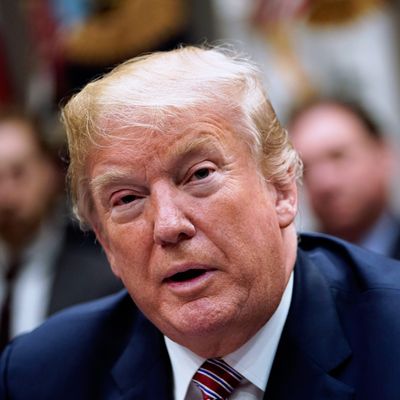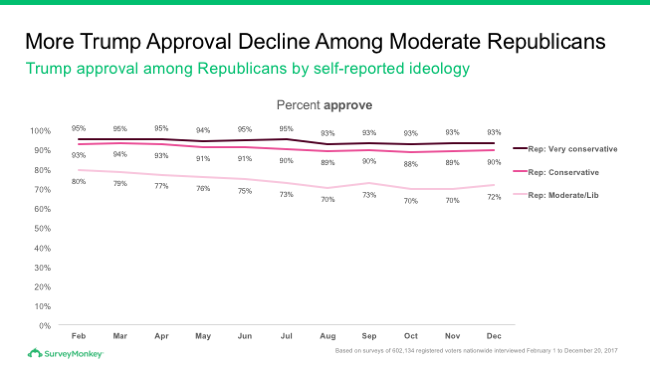
The disgraced former conventional wisdom-meister Mark Halperin coined a phrase, which he used relentlessly, to describe the bad-faith personal attacks that swarmed around politics: the freak show. It turned out Halperin was running a freak show of his own, which explains his “former” status. But the phrase lost much of its power before Halperin disappeared. The premise of freak show, that the fringe operated outside the normal workings of American politics, has decayed over the years. The Trump era put it to rest. The freak show is the main event.
The Conservative Political Action Conference, an annual gathering for right-wing activists and politicians, used to provide a vivid annual display of the freak show. It has also reliably reflected back which ideas and figures the conservative movement would and would not accept under its roof. In 2016, at the height of a divisive primary, Trump himself was regarded with enough suspicion by conservative-movement elites that he had to stay away for fear of instigating a walkout. This year, Trump is the subject of the kinds of lionization previously afforded to Ronald Reagan and George W. Bush. It is a tribute of sorts to Trump’s standing within the movement that previously idiosyncratic figures like Marion Le Pen and Nigel Farage have been put on proud display. They represent the kind of transnational white identity politics that Trump has ushered into the conservative movement and the Republican Party.
What does all this tell us? One interpretation, perhaps the most common one, is that conservatives have lost. “Obviously, conservatism of the Reagan or [William F.] Buckley variety is in the rearview mirror, where today’s American Right is concerned,” laments National Review’s Jay Nordlinger. “Buchananism-Trumpism is in the ascendant.” James Traub suggests, “Conservatives need to rescue their own party, now marshaled under Trump’s populist banner.” Bari Weiss, a conservative alienated by Trump, complains, “[T]he speed at which the organized conservative movement became the ideological home of Marion Le Pen, Seb Gorka, Nigel Farage, Dinesh D’Souza, and their ilk remains shocking to me.”
Consider instead an alternative theory: The current state of the Republican Party is an indication not that conservatives have lost, but that they have won.
Political parties are large coalitions of people that evolve very slowly over time, especially in the United States, with its two-party system preventing the kinds of splintering that can occur among smaller parties in parliamentary systems. Sixty years ago, the conservative movement was an ideological faction within the Republican Party, with one foot inside and one foot out. Its relationship to the party was much like that of the Bernie Sanders movement and the Democrats today. Conservatives barely tolerated leaders like Dwight Eisenhower, Richard Nixon, and Gerald Ford, and frequently entertained forming a third party. When conservative standard-bearer Barry Goldwater won the nomination in 1964 after a bitter conflict, it provoked a far deeper schism than Trump’s nomination did in 2016. Mainstream Republicans stormed out of Goldwater’s convention and denounced him as a racist and extremist. Even the retrospectively sainted Ronald Reagan, who drew conservatives more closely into power than they had been before, broke with them frequently on taxes, immigration, arms control, and other major issues.
The Republican Party was able to function precisely because it balanced the influence of conservatives against traditional Republican pragmatists. The conservative movement’s long march through the institutions has methodically eliminated all rival power sources within the party.
And so, while Trump may have little personal grounding in conservative theory, there are no longer any other sources of ideas or political support on which he can draw. The Trump presidency represents an apex of conservative power. His adherence to doctrine is absolute. Where Trump has wavered, it has been on issues like trade and immigration, where conservatives themselves have long-standing divisions. Conservatives like to imagine Reagan as the beau ideal of a president who faithfully adhered to their principles, but Trump is the president who has actually done it.
++
The dwindling band of anti-Trump conservative intellectuals has persistently cast him as an alien force to their movement. They have dismissed him as an imposter, even a “liberal.” To the extent conservatism has embraced the president, they blame him for corrupting it. “The conservative movement,” writes National Review’s Kevin Williamson, in a bracing and generally admirable column on the proliferation of conspiracy theories around the Parkland shooting, “has become infected with Trump’s dishonesty.”
It would certainly be a huge exaggeration, and a slander against conservatism, to depict Trump as representing nothing but a natural outgrowth of his party. His personal qualities — the gross, corrupt, ignorant, bullying, lazy solipsism — are sui generis. If Trump had never been born, conservatives would not have needed to invent him. In these characterological respects, he is a freak and a historical accident.
But the conservative movement’s willingness to embrace Trump is not an accident. The traits that endeared him to the movement have clear historical antecedents. He follows in the path of other right-wing heroes in American history: Charles Coughlin, Joseph McCarthy, Rush Limbaugh. The founding texts of the conservative movement, None Dare Call It Treason and A Choice, Not an Echo, are conspiracy theories.
Trump’s base within the party lies on its right, not its left. The Republicans who most adore him are the most conservative ones, and those most alienated from him are the most moderate:

Trump’s racism, paranoia, and authoritarianism are all deeply rooted in the American conservative tradition. William F. Buckley supported segregation and white supremacy, and after his shouts of “Stop!” failed to halt the civil-rights train, he again supported white supremacy and segregation in South Africa until that, too, was a lost cause. Buckley had fulsome praise for right-wing dictators like Francisco Franco. These beliefs may not have defined the entirety of his worldview, but they formed an important foundation for it.
Trump did not invent the bizarre right-wing lies about the shooting survivors that are currently enthralling the right. They are being circulated by long-standing conservatives and echoed by Trump. Trump did not invent the birther theory; he exploited it as a way to build his support among conservatives. And the wild accusations Trump promotes are no loopier than the kinds of claims that have been circulated for decades by such platforms as Rush Limbaugh and The Wall Street Journal editorial page (which accused Bill Clinton of murder and linked him with a cocaine ring, among other fever dreams).
Trump habitually repeats theories he sees in conservative media. Donald Trump had a firmer grip on reality as a younger man who primarily followed the mainstream news, before the invention of Fox News. His descent into paranoia is linked with his growing absorption into the right-wing media echo chamber. Trump has not infected conservatism. Conservatism has infected Trump.
This is not an abstract question or a debater’s point. The insistence by conservative dissidents on treating Trump as an alien disease upon their movement prevents them from diagnosing, and therefore treating, the source of the infection. To restore the Republican Party to health, defined as being committed to some baseline relationship with reality and a commitment to democratic governing norms, requires freeing it from conservatism’s grip. It requires a break from decades of American right-wing tradition. And if that sounds like a deeper schism than anti-Trump conservatives are willing to contemplate at the moment, they need to come to grips with the reality that before their party gets better, it is going to get much worse.






























